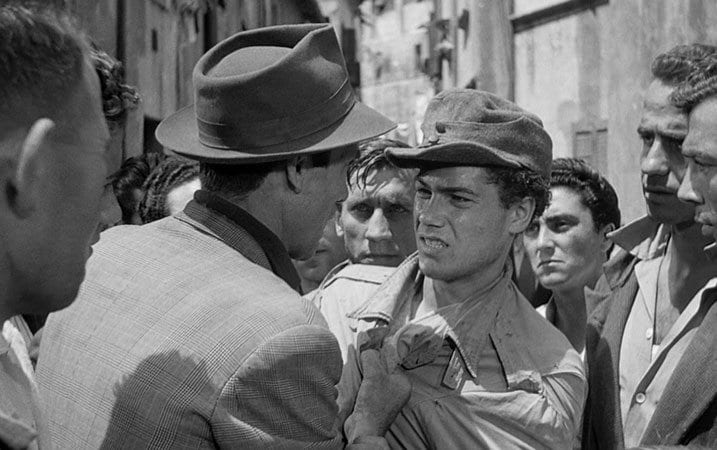Vittorio Antonucci plays a minor role as the thief in “Bicycle Thieves,” the 1947 Italian film that follows the life of character Antonio Ricci whose new job placing posters throughout war torn Rome is jeopardized when his bicycle is stolen. As described by Will Straw in the Introduction to “Small Parts, Small Players” dossier of screen. Minor characters are often “reduced, much of the time, to fleeting moments or undeveloped functions within films, small players raise the question of social identity in its simplest form.” (78) As suggested by Straw minor characters are often limited to brief scenes that shed light on the social identity of other characters in such film. The simplicity of this character’s role can make it difficult to expand upon their function within the grander scheme of “Bicycle Thieves.” The thief is limited to just three scenes, two of which being nonspeaking. His role is used to introduce the main conflict within the film as well as shed important introspection to the common social struggles on men in post-world war Italy. Understanding the context of this time in history where many families are without sources of income and modes of transportation such as a bicycle which can be the means of life and death for struggling families. The theft of the main character Antony Ricci’s bicycles sets the whole film in motion. Conflict is crucial in creating theme; the search for the stolen bike becomes the theme throughout the entirety of the film. After the theft, the “thief” is spotted once before he is caught. The scene where he is chased is used to fuel the anger towards the main character in his search for is bicycle. The thief is eventually caught by the main character whilst roaming the streets and is then bombarded by the thief’s neighbourhood counterparts. At this point, the thief pretends to faint during this interrogation and after the protests from the neighborhood and lack of evidence of the theft Antonio Ricci is left to roaming the streets once again. After an entire day of searching to no prevail Antonio is left in utter desperation. In this moment he is left with all that he believes he can do which is to become a bicycle thief himself. Due the time period assumptions can be made as to why the thief stole the bike in the first place. Living in a war-torn area where many men are searching for work or income by any means it is evident that a man will do whatever he feels to be done to support his family, whether right nor wrong. Straw explains that it is often difficult to say much else about their roles (78) as the thief’s role is used to connect a man’s social identity to the environment, they are in.

Provide Feedback